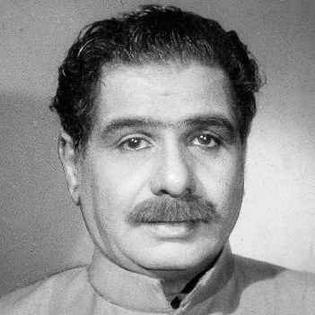Top Qs
Timeline
Chat
Perspective
V. Nagayya
Indian actor (1904–1973) From Wikipedia, the free encyclopedia
Remove ads
Vuppaladadiyam Nagayya Sarma (28 March 1904 – 30 December 1973), popularly known as Chittoor Nagayya, was an Indian actor, singer, music composer, and director known for his works in Telugu cinema, Tamil cinema, and Telugu theatre. Nagayya was one of the first multilingual filmmakers in India.[1] Indian film journalist Baburao Patel described Nagayya as "The Paul Muni of India".[2][3] Nagayya was considered the best character actor in South Indian cinema during 1940s and 1950s.[2] In 1965, he became the first South Indian actor to receive the Padma Shri in Arts from the Government of India for his contributions to Indian cinema.[2][4][5]
Brought up in Chittoor, Nagayya was closely connected to Rama Vilasa Sabha, a Telugu theatre association in the city. He made his film debut in Gruhalakshmi (1938). He worked in several films of Vauhini Pictures such as Vande Mataram (1939), Sumangali (1940), Devata (1941), Swarga Seema (1945), and Beedhalapatlu (1947).[6] Nagayya was also the protagonist in Viswa Mohini (1940), the first film on the Indian motion picture world.[7]
Nagayya made significant contributions to Telugu cinema, and starred in about two hundred Telugu films.[8] He was a method actor, and his forte was usually playing intense characters, often immersing himself in the study of the real character's traits and mannerisms.[8] His other prominent film roles include the 14th-century poet Pothana in Bhakta Potana (1942), 17th-century saint Tyagaraja in Thyagayya (1946), 12th-century saint Gora Kumbhar in Chakradhari (1948), and Sivaram in the social problem film Naa Illu (1953).
In 1964, Nagayya essayed the 17th-century saint Bhadrachala Ramadasu in the film Ramadasu which he had also co-written, directed and produced. The film won the National Film Award for Best Feature Film in Telugu.[9] Nagayya also starred in about one hundred and sixty films in Tamil, Kannada, Malayalam, and Hindi.[5] In his honour, the Chittoor Nagayya Kalakshetram of Arts was established in Chittoor of Andhra Pradesh.[10]
Remove ads
Early life
Summarize
Perspective

Nagayya was born on 28 March 1904 in a Telugu family in a tiny hamlet near Repalle, Guntur district, Andhra Pradesh. His parents were Ramalinga Sarma and Venkata Lakshmamba. His maternal grandmother adopted him and took him to her native village, Gonugur, near Kuppam and later to Chittoor. He took up studies with a scholarship provided by the Tirupati Devasthanam and took his degree in Chittoor.[11]
After working as a clerk in a government office, Nagayya became a journalist with Andhra Patrika. Mahatma Gandhi and Nehru influenced him and he participated in the freedom struggle (Dandi Satyagraha) in 1930, later going on to work for some gramophone companies including Hutchins as well as attending the Gowhati Congress conclave with S. Srinivasa Iyyengar.[12] He was married to Jaya Lakshmi, but she died giving birth to a daughter a year after. He then married Girija, and she too died due to miscarriage in the eighth month. His first daughter died of an undiagnosed illness. He then participated in long stays at Ramana Maharshi Ashram. He had family in Tirupati who are his brother's (Vuppaladadiyam Subrahmanya Sarma) son, Vuppaladadiyam S. Haragopal and daughters (Late Amruthavalli and Late Kusuma), Lakshmi Narasimha and their children, Vuppaladadiyam Shyam Sundar and Vuppaladadiyam Pavan Kumar.[13]
Remove ads
Accolades
- Civilian Awards
- Padmashri, Government of India in 1965
- National honors
- Abinava Thyagaraju by the Maharaja of Travancore
- National Film Award for Best Feature Film in Telugu (director) – 1964 for Ramadasu
- State Awards
- Best Actor Award by the Andhra Film Journalists Association
- Felicitated by a life size statue in Panagal Park, Chennai at his demise.
Selected filmography
Actor
- Composer and play back singer
- Playback singer
- Ramadasu (1964)
- Tenali Raman
- Gumasta (1953/II) (playback singer and composer)
- Naa Illu (1953) (playback singer and composer)
- Yogi Vemana (1947) (playback singer and composer)
- Thyagayya (1946) (playback singer and composer)
- Swargaseema (1945) (playback singer and composer)
- Bhakta Potana (1942) (playback singer and composer)
- Devatha (1941) (playback singer and composer)
- Sumangali (1940) (playback singer and composer)
- Viswa Mohini (1940) (playback singer)
- Vande Mataram (1939) (playback singer and composer)
- Gruhalakshmi (1938) (playback singer)
- Director (partial filmography)
- Producer (partial filmography)
- Naa Illu (1953)
- Writer (partial filmography)
- Thyagayya (1946)
Remove ads
References
External links
Wikiwand - on
Seamless Wikipedia browsing. On steroids.
Remove ads

